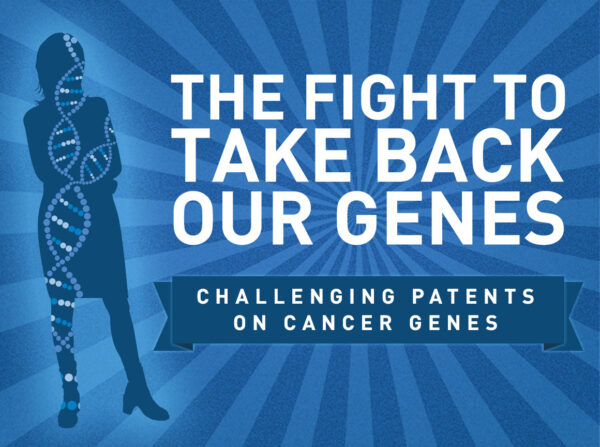Case Challenging Patents on Breast and Ovarian Cancer Genes Returns to Appeals Court
After Being Sent Back by Supreme Court, ACLU and PubPat File on Behalf of Medical Associations, Geneticists, Patients and Women’s Health Groups
FOR IMMEDIATE RELEASE
CONTACT: (212) 549-2666; media@aclu.org
WASHINGTON – The American Civil Liberties Union and the Public Patent Foundation filed a brief with the U.S. Court of Appeals for the Federal Circuit today in an ongoing case seeking to invalidate patents on two human genes associated with hereditary breast and ovarian cancer. The patents on the genes allow a Utah company to control access to crucial genetic tests that could lead to life-saving treatment.
The lawsuit against Myriad Genetics and the University of Utah Research Foundation, which holds the patents on the genes, charges that the challenged patents restrict both scientific research and patients’ access to medical care and are invalid because genes are “products of nature.”
In July 2011, a divided federal appeals court ruled that companies can obtain patents on the genes but invalidated the patents on methods of comparing genetic sequences. A federal district court previously had invalidated all of the challenged patents. In March, the Supreme Court of the United States vacated the appeals court decision after ruling in another case that patents on determining a patient’s response to a drug were invalid because they were claims on laws of nature.
“We’re grateful for a second chance to make the case that a company cannot claim to invent something as natural as human DNA,” said Chris Hansen, staff attorney with the ACLU Speech, Privacy and Technology Project. “Doctors and medical researchers should not be hindered from conducting life-saving research because one company has claimed the exclusive right to control something that occurs in nature.”
The patents granted to Myriad give the company the exclusive right to perform diagnostic tests on the BRCA1 and BRCA2 genes and thus to control the diagnostic care provided to hereditary breast and ovarian cancer patients and people at high risk for these diseases.
“The idea that anybody invents human genes and has the sole right to control them is absurd,” said Daniel B. Ravicher, executive director of PUBPAT and co-counsel in the lawsuit. “Genes that occur naturally in every human being should not be patented.”
Myriad's monopoly on the BRCA genes allows it to set the terms and cost of testing and makes it impossible for women to access alternate tests or get comprehensive second opinions about their results. It also allows Myriad to prevent researchers from even looking at the genes without first getting permission from Myriad.
“Women are making life-changing decisions based on the outcomes of these tests,” said Sandra Park, staff attorney with the ACLU Women’s Rights Project. “Allowing gene patents to stop patients from getting a second opinion or to block the development of better tests and treatments is both unlawful and inhumane.”
The restrictions on examining the BRCA genes can have devastating results. Kathleen Maxian of Buffalo, N.Y. is suffering from late-stage ovarian cancer that she believes could have been prevented. Her sister, who is a breast cancer survivor, obtained a test from Myriad that did not look for all known genetic mutations associated with cancer and was told she was negative for mutations. Years later her sister learned that she did, in fact, have a BRCA genetic mutation -- information that Maxian could have relied on to seek preventive surgery. Numerous labs across the country have stated that they are capable of providing this comprehensive screening and would do so were it not for the patents.
“These companies need to realize that this is bigger than them,” said Maxian. “They need to let other researchers have access to these genes if they’re going to save lives.”
Arguments in the case are set for July 20.
The lawsuit was brought by researchers, genetic counselors, patients, breast cancer and women's health groups, and medical professional associations representing 150,000 geneticists, pathologists and laboratory professionals. Attorneys on the case include Hansen, Park, Aden Fine and Lenora Lapidus of the ACLU; and Ravicher and Sabrina Hassan of PUBPAT.
To see the brief, go to:
For more information on this case, please visit


